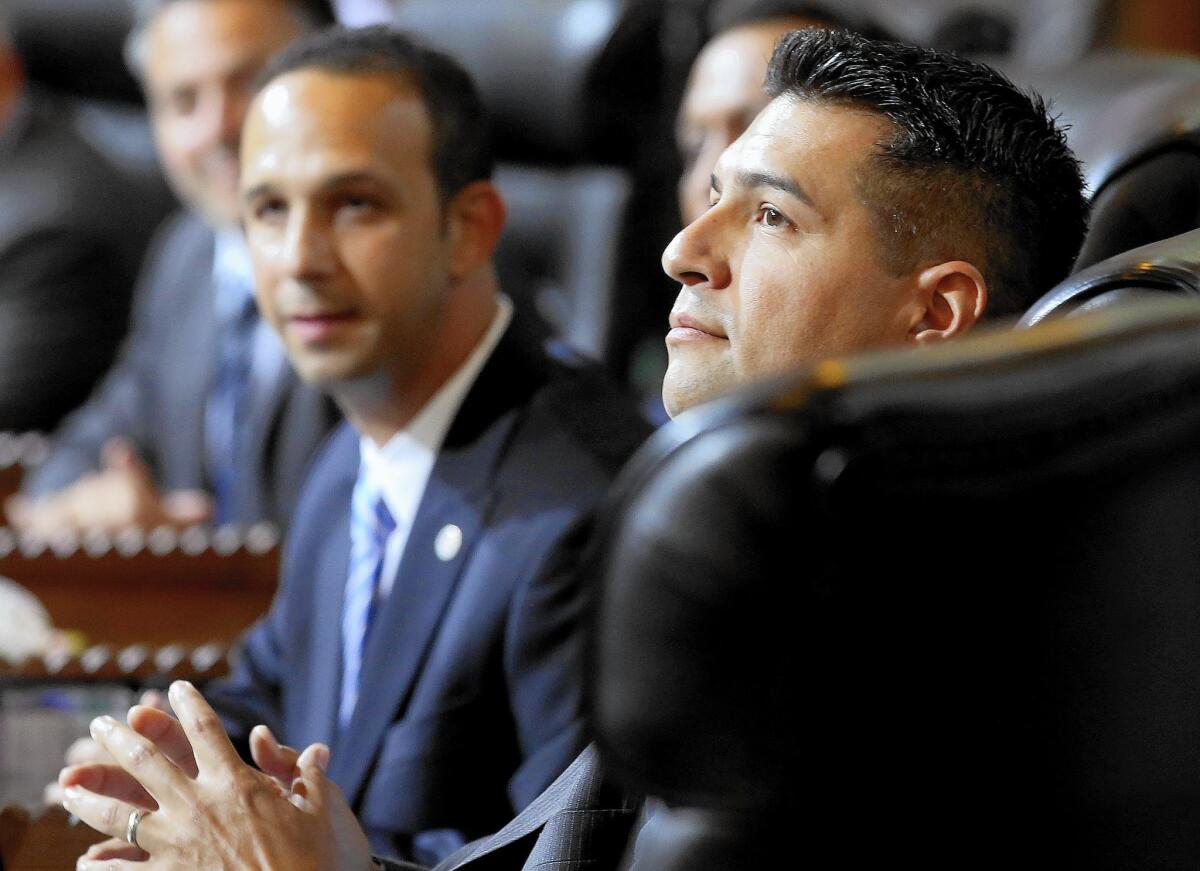L.A. councilman blocks DWP move even as he advocates less political meddling at utility

- Share via
In a push to reform the Department of Water and Power, Los Angeles City Councilman Felipe Fuentes has argued that council members should have less sway over its decisions.
Fuentes has championed a proposed ballot measure that would stop the City Council from routinely approving contracts, real estate deals and other decisions made by the DWP board — part of an overhaul that he says would reduce political meddling in the operations of the utility.
Yet recently, when the department sought to extend key deadlines for solar energy companies that have deals with the city, Fuentes effectively blocked the move, exercising his power as a council member.
Under the existing system, “I would not be doing my job if I allowed a flawed agreement to move forward,” Fuentes said in a written statement, explaining why he hadn’t put the matter before a council committee he leads.
Utility staffers are now trying to amend their plan to address his concerns, eyeing a looming deadline that could cost the solar companies millions of dollars.
Critics say that by blocking the original plan, Fuentes has continued to flex his muscle over the DWP as a council member, even as he advocates to scale back some of those powers.
“It’s in stark contradiction with what he’s trying to do,” said Walker Foley, Southern California organizer with the consumer and environmental advocacy group Food & Water Watch. Foley has raised concerns about how Angelenos would hold the utility accountable if council oversight were weakened.
Fuentes disagreed with the idea that there was any contradiction. The dispute has erupted amid larger questions about how far his proposed measure would ultimately go to curb council involvement.
Under his proposal, many day-to-day utility decisions would not automatically go to the council, but the council would retain the power to step in and override DWP board decisions.
The council should give up that power “if you really want to make the board and department much freer of interference by elected officials,” UC San Diego professor of political science Steve Erie said. “But the City Council is loath to do that.”
The solar agreements are part of the Feed-in Tariff program, which enables energy companies to sell the solar power they generate to the utility. Two years ago, the city struck deals to pay SunEdison and Hecate Energy to develop a total of 50 megawatts of solar power.
Under agreements with the city, those companies have to meet a string of deadlines for putting solar power into operation. If those deadlines aren’t extended by the end of March, the firms could have to pay as much as $10 million and lose their rights to sell energy to L.A. under the deals, according to utility officials.
The DWP board backed the planned extensions. So did the city ratepayer advocate. Utility officials said it made more sense to grant the extensions than collect damages from the solar companies, citing “development challenges” that delayed their progress.
“There were all these city delays,” said Mary Leslie, president of the Los Angeles Business Council, an advocacy group that supports the Feed-in Tariff program. For instance, Leslie said, the city decided that such solar arrays needed to obtain a certain kind of planning permit that took more time.
Fuentes said the department had already postponed a first deadline by six months because of those city delays, before the companies sought a second extension to the agreed-upon deadlines.
“If DWP were to allow these companies to miss deadlines without penalty, it would set a costly precedent,” signaling that its contracts “have no teeth,” Fuentes said.
Fuentes added that if his suggested reforms were adopted, the utility would have a professional, full-time board that “would be better positioned to scrutinize and fix such proposals.”
SunEdison and Hecate Energy declined to comment on the proposed extensions. Councilman Paul Koretz, who sits on the committee that Fuentes leads, said he didn’t believe that the firms should be penalized.
“We want to support the companies that are moving us toward higher use of solar and not disincentivize them,” Koretz said, mentioning some of the city delays that had hampered their progress.
Even if Fuentes is doing the right thing, “this points up the problem” with how the utility is now overseen, former DWP board member Richard Moss said.
“The staff says, ‘Hey, we should be doing this.’ The board goes along with that. Now the City Council has to approve it — it’s like, ‘Who is responsible?’” Moss said.
Outside consultants have argued that the DWP is too vulnerable to political interference. Fuentes has said his proposed measure would help minimize such City Hall meddling by giving up key powers that the mayor and council hold over the department.
That has troubled some critics who fear the utility would become less accountable to the public. “The way to improve government is scrutiny, openness and criticism — that’s what the council got elected to do,” said Julie Butcher, a retired city union leader.
However, Fuentes said he would retain a process, set forward in the city charter, that lets the council veto decisions made by the DWP board and other city commissions. Lawmakers have used that power, called a “245,” to block rate increases in the past.
Fuentes said that would allow the council to step in, with discretion, “if it felt the utility was not acting in the best interest of ratepayers.” Two-thirds of its members must agree to veto a decision.
Others worry, however, that the process would allow continued council meddling. “You’re going to get reform in name but not in practice,” said Moss, the former DWP board member.
Twitter: @LATimesEmily
More to Read
Sign up for Essential California
The most important California stories and recommendations in your inbox every morning.
You may occasionally receive promotional content from the Los Angeles Times.











